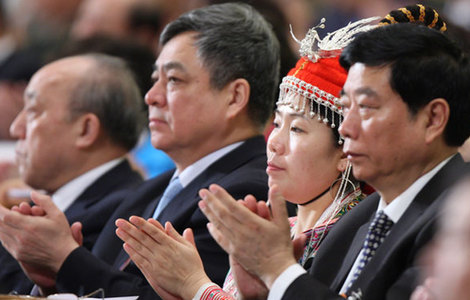 |
|
|
|
|||||||||||
NPC deputies urged the government to narrow the gap between urban and rural cultural development and encourage more cultural workers to get engaged in China's countryside.
"Grassroots cultural development, especially in rural areas, is the basis to build China into a culturally strong country," said Zheng Xiaoxing, a NPC deputy from Southwest China's Sichuan province and also director of the Sichuan provincial department of culture.
"In fact, there is still a huge disparity between China's urban and rural cultural development, therefore the strategic focus should be on China's vast rural areas from now on," Zheng said.
He said in recent years China has invested a lot in the cultural infrastructure construction in rural areas, especially in the less developed western regions.
The country has also launched a series of major cultural projects to promote grassroots cultural development, which have greatly enriched the cultural life for Chinese farmers.
"The most significant change in China's cultural development is the tilt of the allocation of cultural resources from urban to rural," Zheng said, "which allows rural residents to get access to more cultural services or products that can only be enjoyed by city dwellers in the past."
He said that in 2012, the Sichuan provincial government will allocate 2 billion yuan ($317 million) for the construction of public cultural facilities, of which 1 billion yuan will be used directly for cultural activities in villages and townships.
He said the increased investment in cultural development in West China during China's 12th Five-Year Plan (2011-15) period would a big leap to bridge the gap likely.
But Zheng said China still faces huge challenges in rural cultural development, especially with huge shortage of talents.
"The rural cultural infrastructure is getting better year after year.
"But the lack of high-quality grassroots cultural workers has become a bottleneck restricting the rural cultural development," Zheng said.
To reverse the situation, Zheng suggests attracting more college graduates to be engaged in grassroots cultural work.
"China's grassroots cultural construction needs more workers willing to commit to the economically backward countryside, but such people are too few right now."
Some deputies say the government at various levels should do more to promote cultural activities among farmers.
Wu Ying, iPad, Jeremy Lin, Valentine's Day, Real Name, Whitney Houston, Syria,Iranian issue, Sanyan tourism, Giving birth in Hong Kong, Cadmium spill, housing policy

|

|

|

|

|

|